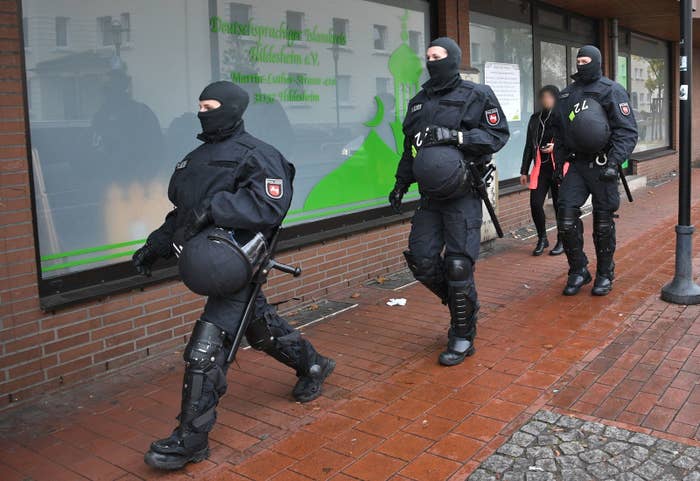
America’s European law enforcement and intelligence allies in the global fight against ISIS, al-Qaeda and other transnational threats ranging from human smuggling to narcotics woke up to the most hated of all situations for intelligence professionals: Uncertainty over the policies and commitment to alliances by the most powerful country on the planet.
None of the current and former intelligence and security officials reached by BuzzFeed News Wednesday in the wake of Donald Trump’s election victory would speak to the situation on the record because of legal or political considerations, but half a dozen professionals ranging across four key European allies expressed grave concern about the lack of information about the composition or ideology of the incoming administration. This uncertainty over virtually every aspect of US security policies, commitment to previous alliances and pacts and possible new actions on a host of issues from the Iranian nuclear deal to positions on Russia’s aggressive expansion of influence throughout Europe would have far reaching consequences for much of the world.
“Bomb the shit out of ISIS isn’t exactly a policy,” said an official at the French Ministry of Defense who works closely with that country’s external intelligence agency, DGSE. “Besides the fact that the coalition has been bombing every known ISIS target for almost two years to great success, we’re rather uncertain about how US policy might change as part of this long-term international coalition that has been working closely together for more than 60 years on security and international Islamist threats for over 25.”
France, like the United Kingdom, has a uniquely close relationship with the US on intelligence and counterterrorism matters, including a program that embeds officers within each other’s operations to allow for the ability to plan face-to-face. And while this program isn’t expected to change, said the source, what remains unclear is how the US will approach many long-term relationships.
“France has had its own long term concerns about giving up military sovereignty to NATO as history has shown,” he said, referring to the decision by France in the 1960s to withdraw its troops from direct command of the alliance. “But obviously cooperation with the US on all of these international issues from a newly aggressive Russia to international terrorism to energy and resource security to climate change is critical to France and we know much less about this will work in the next administration than we usually would in this situation.”
“And there’s the issue of his — colorful personality,” the official said of the president-elect. “It’s bad enough to not have a firm grasp of what sort of advisors and officials he will appoint but his own statements call into question how much America’s allies will be dealing with a long standing national security establishment that is predictable or the whims of one unpredictable man.”
An advisor specializing in Syria for a key American ally who works in a coordination office in the Middle East with US military personnel said that the shock of the Trump victory had not settled in and that with the sheer number of unanswered questions about the approach, specifically to Syria, which ranged from uncertain new relationship with Russia, to the campaign promise to void the Iranian nuclear deal, to the reshuffling of priorities had left much of his office speechless.
“Oh fuck. I was talking to an American official this morning. He was like :O,” he said by messenger using an emoji. “Anyway, he was in shock. I think no one knows yet [what this means for Syria and Middle East policy]. Not even Trump [knows].”
“I reckon we'll see thinking emerge in a month or so,” he said. “Depending on how the DC world of advisors, think tankers etc react. Who knows, Trump might get annoyed at the lot of them and do his own random thing.”
Another factor that might affect alliances in the Middle East region and even worldwide is the nativist populism of the campaign that frequently employed anti-foreigner tropes about globalization, international trade and America’s international responsibilities, according to the advisor, who argued the perception of the incoming administration, fair or not, will likely hurt American credibility if the new administration takes a tone of an authoritarian strongman, which was an overt part of its campaign for office.
“And just like the Middle East, the U.K. and the US are now ruled by people who have the same level of policy sophistication as taxi drivers,” he said.

Another UK security professional said that the key factors remained uncertain but that Trump’s personality and the allegations of close ties with the Russian government of Vladimir Putin were giving him significant pause about the inherent dangers in terms of foreign policy.
“Well, it's impossible to make an assessment when no one knows how he will react,” he said. “My biggest concern are his links with Russia and how that will affect Syria and his clearly brash approach to life which is the last thing US foreign policy needs.”
In terms of law enforcement cooperation in dealing with the ISIS threat to Europe, a Belgian Federal Police official specializing in counter-terrorism threats said that he doubted much would change on the operational cooperation level but that major changes in rhetoric could complicate countering extremism programs and ratchet tensions with Muslim communities across Europe and the rest of the world that could put counter terror programs at risk.
“Heating the rhetoric, which seems likely at this stage, can only be counterproductive [in terms of combating ISIS,” he said. “I, like many cops, am a pretty conservative guy and I vote to the right myself. But even I can’t see this as anything but a victory for ISIS and other radicals because it forces societies to further polarize. Their message that the West has no place for you and only conflict can protect Muslims from oppression will likely become much easier to sell just off the campaign rhetoric, let alone how it will inspire more and darker rhetoric from right wing groups here in Europe.”
“They don’t fear him militarily anymore than they already fear the West in these terms,” he added. “If additional military action was required to address that threat, I can’t doubt that it would have already been vigorously pursued. But what we have learned from the experience of Iraq and Afghanistan, as well as Europe’s own colonial battles stretching back a century, is that there’s a limit to the utility of military force. If it was likely to work and not make things much worse, I think we would have been using the massive military advantage we hold already.”
